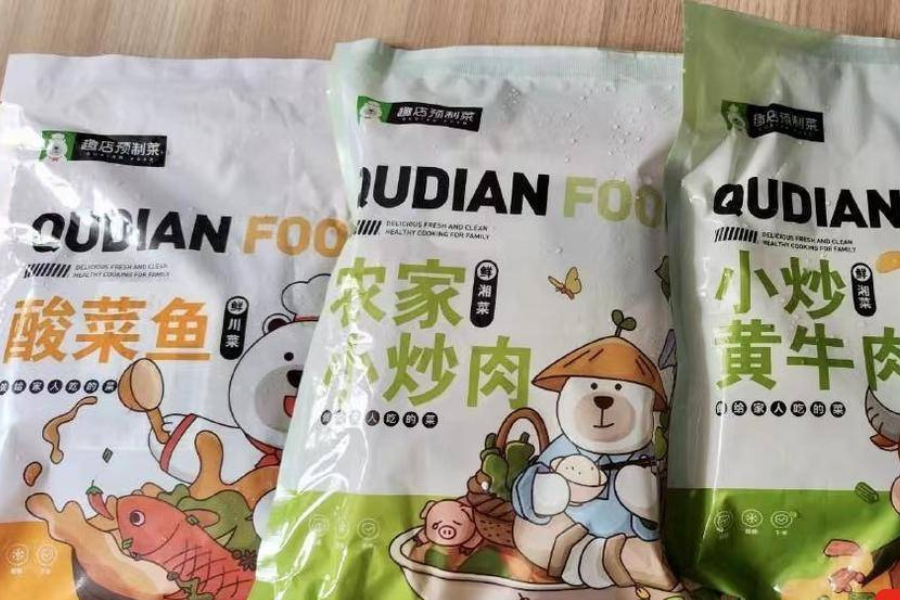Qudian in Search of a Business as Stock Returns to Penny Territory

The former fintech highflyer was warned a third time about possible delisting this year after its stock fell below $1 on the failure of its latest new foray into the food industry
Key Takeways:
- Qudian was notified by the New York Stock Exchange that it was in violation of listing rules that require its stock price to stay above $1
- The warning was its third one this year, and came after the company said it was scaling down a food business it started just six months ago and ceased its main lending business
By Warren Yang
Qudian Inc.’s (QD.US)’s stock is once more flirting with penny territory as the once-flourishing online lender faces an identity crisis that shows no signs of quick resolution.
The company, which was trying to radically reinvent itself as a seller of ready-to-cook meals, said last Friday it was notified by the New York Stock Exchange (NYSE) that it’s in breach of listing rules that require its stock to stay above $1 after the shares’ average closing price for 30 consecutive trading days slipped below that floor. The company now has six months to prop the stock back up above the $1 mark, or risk potential delisting.
Qudian is no stranger to such warnings. It received a similar letter from the NYSE as recently as May, but managed to meet the minimum listing requirement in August after its stock rose above $1. Before that, the company was warned for the same reason in February, reflecting the hot-and-cold winds blowing the stock around the $1 level.
Qudian received its latest delisting threat after it indicated it was ditching its new ready-to-cook meal business, QD Food, which it launched just about six months ago. “After assessing current market conditions, the company has decided to streamline its QD Food business,” Qudian said in its latest quarterly earnings report released early this month. It added that it will “continue to explore new business opportunities and protect long term value for its shareholders.”
Exactly what is happening with that new venture is unclear. But it appears that Qudian is scaling down the business significantly, if not winding it down completely. The company said it will be hit by employee severance costs, fees for terminating partnerships and inventory write-offs, which appear to point to a full closure of the business.
The move came as a surprise since Qudian had trumpeted the business as its new road to riches just months earlier. In July, it boasted how a live-streaming event it held on Douyin, the Chinese version of the popular TikTok short-video app, generated sales of millions of dishes from the service. It also highlighted its capabilities to deliver products to more than 200 locations across China using a network of more than a dozen warehouses, and assembly and packaging facilities.
While exact circumstances behind the sudden change of heart are a bit of a mystery, going from online lender one day to food seller the next was always going to be a long shot. More broadly, the move underscores the urgency that a field of formerly highflying Chinese online lenders are feeling to find new business models after Beijing cracked down on them to stem excessive growth in private credit.
Some of Qudian’s rivals, such as 360 DigitTech (QFIN.US) and FinVolution (FINV.US), have made much less radical shifts from direct lenders to loan facilitators between consumers and banks.
A different game
Such moves closer to their original business make much more sense than ones like Qudian’s that are taking it into completely unfamiliar terrain. Unlike lending that requires capital but very little fixed assets, selling meals requires much higher fixed costs to run physical facilities like warehouses and employ delivery staff. Competition in food delivery is also intense. Reflecting these challenges, Missfresh Ltd. (MF.US), which pioneered speedy grocery delivery in China, is facing an existential crisis after burning through more than $2 billion since its inception.
Food sales haven’t been the only area Qudian has tried. In another slightly desperate effort to pivot away from lending, Qudian also tried its luck with an education business, opening its first tutoring center under the WLM KIDS brand at the start of last year. But the move couldn’t have been more ill-timed, as China’s private education sector soon became another target for regulators. The resulting crackdown saw strict limits placed on the times after-school tutoring centers could operate and banned for-profit companies from offering such services to reduce stress on kids.
Even before the crackdown, it was always questionable how Qudian would repurpose its resources to move into the tutoring business, making the move look more opportunistic than logical.
In March, Qudian said it would also “significantly” downsize that business. Although it didn’t say it would shut it completely, it seems safe to assume that the tutoring venture is history, given that Qudian no longer mentions it in its earnings reports. QD Food now seems to be going the same way of the education unit.
But that’s not the worst part. In its second-quarter earnings release, Qudian said it decided to cease its core lending business altogether, carrying through on its earlier signals that it was considering dropping the business. As a result, its revenue plunged 74% year-on-year during the three months, pushing the company into the red.
Essentially, Qudian is now nothing more than a shell with no real business. But the cash it needs to maintain itself is fast dwindling, with interest from its remaining outstanding loans as its only income source. It doesn’t help that the company plans to spend up to $200 million to buy back its shares over a two-year period, which looks like a last resort to breathe some life into its stock and keep it above $1.
The $200 million sum is just under half of the cash and cash equivalents that the company held at the end of June. Prior to that, Qudian had already spent more than $580 million repurchasing its stock, which has been dropping precipitously since its market debut at $24 in 2017.
Any boost to the price of a stock from a share buyback is bound to be temporary, especially if the company has no better use for its idle capital. Qudian clearly doesn’t seem to know what it wants to be at this point.
Without a viable business, Qudian will probably continue to lose money, eroding its cash holdings. And shrinking capital will limit its ability to start any new business, which will involve significant investment, no matter what it is. As things stand now, Qudian could have trouble raising new funds from investors, through either an equity or debt sale, given its poor record at starting new businesses.
Qudian shares now trade at a price-to-book (P/B) ratio of just 0.13. That compares with 0.76 times for FinVolution and 0.85 for 360 DigiTech, which aren’t so spectacular either but look stellar compared to Qudian’s figure. But for a company that appears to be floating aimlessly, it’s hard to expect anything more.
To subscribe to Bamboo Works free weekly newsletter, click here






